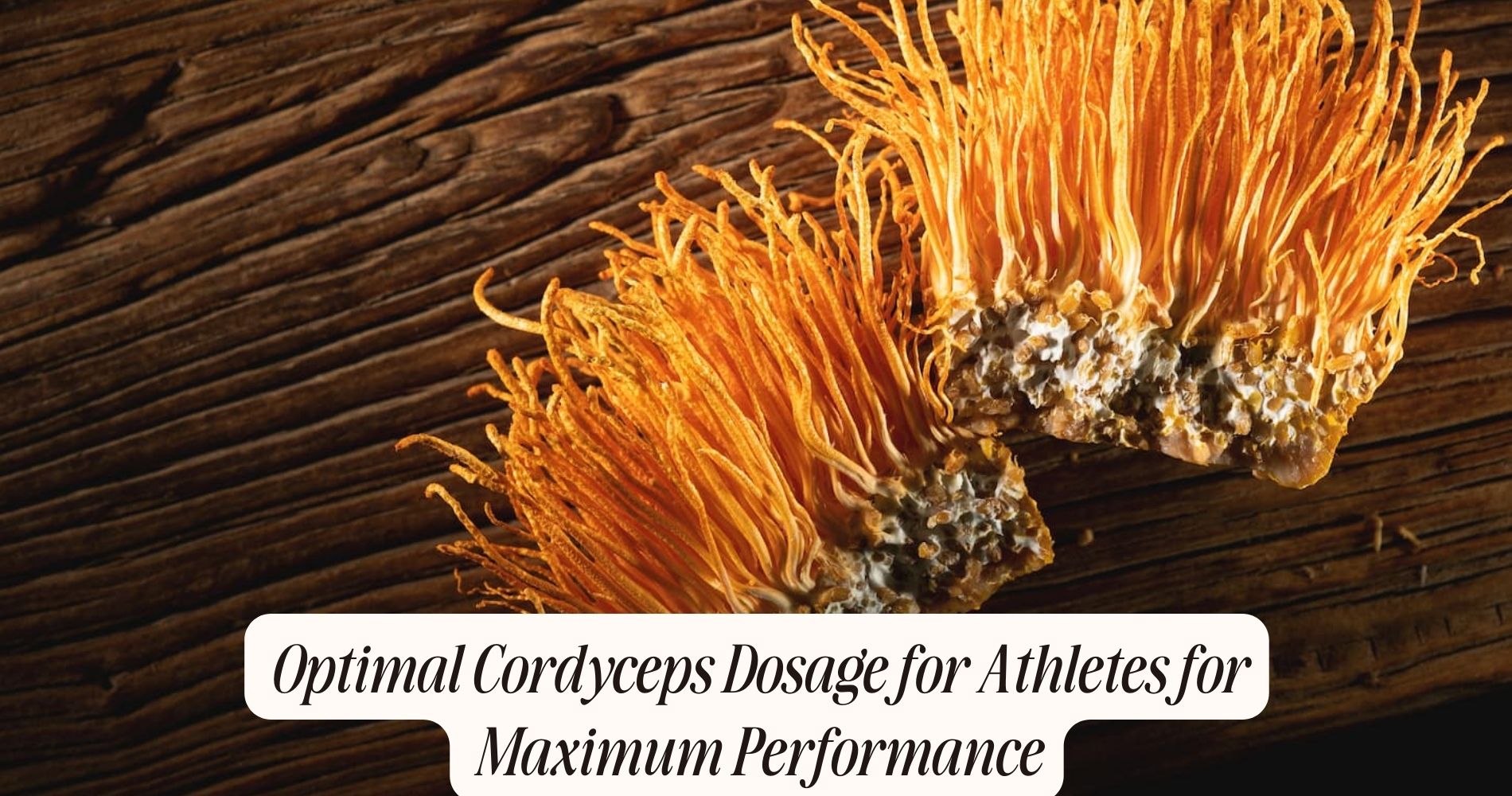
Optimal Cordyceps Dosage for Athletes for Maximum Performance
Understanding Cordyceps
Cordyceps, a type of parasitic fungus known for its bioactive compounds, has gained attention for its potential to enhance athletic performance and overall well-being. Originating from the high-altitude regions of China, cordyceps primarily infects insects and arthropods, extracting nutrients from their hosts. This unique fungal origin contributes to its rich profile of bioactive compounds, including cordycepin and adenosine, which are pivotal for its therapeutic properties.
Traditionally, cordyceps has been utilized in Chinese and Tibetan medicine for centuries. Its historical applications range from boosting energy and stamina to improving respiratory function and sexual health. These traditional uses are now being validated by modern science, which continues to investigate the exact mechanisms through which cordyceps exerts its benefits.

When analyzing cordyceps, you'll find that its nutrient content is particularly compelling. It's a source of essential amino acids, vitamins (notably B vitamins), and minerals such as potassium, calcium, and magnesium. These nutrients contribute to the fungus's overall health-promoting effects, underscoring its role in supporting metabolic processes and cellular energy production.
Understanding these foundational aspects of cordyceps helps you appreciate its potential applications in modern health and athletic performance contexts.
Benefits for Athletes
You'll find that Cordyceps can greatly enhance endurance levels by increasing ATP production, which fuels muscle activity.
Research indicates it also helps reduce oxidative stress, thereby improving recovery time post-exercise.
These benefits make Cordyceps a valuable supplement for athletes seeking performance optimization.
Enhanced Endurance Levels
Enhanced endurance levels are one of the primary benefits athletes may experience due to the bioactive compounds found in Cordyceps, particularly adenosine and cordycepin. These compounds play essential roles in enhancing oxygen utilization and metabolic efficiency, which are pivotal for endurance performance.
Adenosine, a component of ATP, the energy currency of cells, facilitates improved oxygen delivery to muscles. This enhancement in oxygen utilization allows your muscles to function more effectively during prolonged physical activity.
Cordycepin, on the other hand, supports the body's metabolic pathways by increasing the efficiency of energy production. It optimizes mitochondrial function, thereby boosting ATP synthesis. As a result, your muscles can sustain higher levels of activity without rapid onset of fatigue. This metabolic efficiency translates to an increased capacity for endurance, allowing you to push your limits further.
Clinical studies have shown that Cordyceps supplementation can lead to significant improvements in VO2 max, a measure of the maximum amount of oxygen your body can utilize during intense exercise. This enhanced oxygen uptake directly correlates with better endurance performance, making Cordyceps a valuable addition to your athletic regimen for maximizing endurance levels.
Improved Recovery Time
Athletes may experience greatly reduced recovery times due to the vital and ideal properties of Cordyceps, which aid in muscle repair and reduce oxidative stress. By mitigating inflammation, Cordyceps helps decrease muscle soreness, allowing you to return to your training regimen more quickly.
The bioactive compounds in Cordyceps, such as cordycepin and adenosine, play an essential role in modulating the inflammatory response and promoting cellular repair.
Moreover, Cordyceps' potent antioxidants neutralize free radicals generated during intense physical activity, which is essential for injury prevention. This reduction in oxidative stress not only accelerates muscle recovery but also enhances overall muscle function, ensuring you're less prone to injuries.
By incorporating Cordyceps into your supplementation routine, you can benefit from its ability to enhance mitochondrial function, leading to better energy production and quicker recovery.

The adaptogenic properties of Cordyceps also help in balancing the body's stress response, further aiding in reducing muscle soreness and preventing overtraining.
Ideal dosages, typically ranging from 1,000 to 3,000 mg per day, have been shown to maximize these recovery benefits, making Cordyceps a valuable addition to any athlete's nutrition plan.
Scientific Evidence
Numerous studies have demonstrated that Cordyceps can enhance athletic performance by improving oxygen utilization and increasing ATP production. Clinical trials have consistently shown that athletes who supplement with Cordyceps experience enhanced aerobic capacity and endurance.
For instance, one study revealed a significant increase in VO2 max, a critical measure of cardiovascular fitness, among participants who consumed Cordyceps over a period of several weeks. The molecular mechanisms underlying these benefits are equally compelling. Cordyceps has been found to stimulate the production of adenosine triphosphate (ATP), the primary energy carrier in cells.
By increasing ATP levels, Cordyceps effectively supports prolonged physical activity. Additionally, it enhances oxygen uptake by modulating the activity of enzymes involved in cellular respiration, thereby improving overall energy efficiency.
Furthermore, Cordyceps contains bioactive compounds like cordycepin and polysaccharides, which have been identified to exert antioxidant and anti-inflammatory effects. These properties not only contribute to better performance but also aid in reducing muscle fatigue and oxidative stress during intense exercise sessions.
Optimal Dosage Guidelines
To optimize Cordyceps benefits, you should consider the recommended daily amount, typically ranging from 1,000 to 3,000 mg.
Taking Cordyceps in the morning may enhance absorption and efficacy due to the body's natural rhythms.
Additionally, adjusting the dosage based on body weight can maximize its performance-enhancing effects.
Recommended Daily Amount
Frequently, athletes aiming to enhance their performance should take into account a daily dose of 1,000 to 3,000 milligrams of cordyceps, based on current clinical research. This dosage range is supported by numerous studies highlighting cordyceps' ability to improve aerobic capacity, increase ATP production, and reduce fatigue.
Importantly, cordyceps' cultural significance and historical usage underscore its efficacy. Traditionally employed in Chinese and Tibetan medicine, cordyceps has been used for centuries to boost energy, stamina, and overall vitality.
When determining your best dosage, it's important to take into account the form of cordyceps you're taking. Whether you choose a powder, capsule, or liquid extract, make sure that the product is standardized to contain bioactive components like cordycepin and adenosine. These compounds are crucial in achieving the desired ergogenic effects.

Incorporating cordyceps into your daily routine can offer substantial benefits, but always start at the lower end of the dosage spectrum to assess tolerance. Gradually increasing the dose within the recommended range allows your body to adapt and maximize nutrient absorption. Remember, individual responses can vary, so monitoring your performance and adjusting accordingly is important.
Timing for Best Results
Understanding the most advantageous timing for taking cordyceps can greatly enhance its ergogenic benefits and maximize athletic performance. Research indicates that morning consumption may optimize the bioavailability of active compounds like cordycepin and adenosine, which are vital for increased energy production and reduced fatigue. By taking cordyceps in the morning, you can guarantee that these bioactive components are present during peak metabolic activity, thereby enhancing their effectiveness.
Pre workout timing is also critical. Consuming cordyceps approximately 45 minutes to an hour before exercise can boost oxygen utilization and improve ATP production, leading to better endurance and performance output. This window allows the bioactive compounds to be absorbed and start exerting their physiological effects right when you need them most.
Moreover, aligning cordyceps intake with your circadian rhythm can further optimize its benefits. Morning consumption aligns with the body's natural cortisol peaks, aiding in better utilization of the supplement. Combining these strategies ensures that cordyceps' ergogenic properties are maximized, thereby supporting your athletic objectives efficiently.
Adjusting for Body Weight
Finding the most suitable cordyceps dosage according to body weight is crucial for maximizing its ergogenic effects and ensuring safe, effective supplementation. Athletes of different weight categories require tailored dosage variations to optimize cordyceps' impact on performance and recovery.
For individuals weighing less than 150 pounds, a common guideline is to start with a daily dose of 1,000-1,500 mg. This range guarantees an adequate amount of bioactive compounds to enhance cellular energy production without overloading the system.
Athletes in the 150-200 pound weight category might benefit from a slightly higher dosage, typically ranging from 1,500-2,000 mg per day. This adjustment takes into account the increased metabolic demands and muscle mass.
For those exceeding 200 pounds, a daily intake of 2,000-2,500 mg is often recommended. This higher dosage supports the greater physiological needs due to higher body mass and overall energy expenditure.
Always consider starting at the lower end of these ranges to assess individual tolerance and response before gradually increasing.
Factors Influencing Dosage
Athletes' ideal Cordyceps dosage depends on various factors such as body weight, metabolic rate, and exercise intensity. Your individual metabolism plays a critical role in determining how efficiently your body processes Cordyceps. If you have a faster metabolism, you might require a higher dosage to achieve peak performance benefits. Conversely, a slower metabolic rate may necessitate a lower dosage to avoid potential nutrient overload.
Age considerations also influence the appropriate Cordyceps dosage. As you age, your metabolism tends to slow down, affecting how your body absorbs and utilizes nutrients. Therefore, older athletes might need to adjust their Cordyceps intake accordingly, usually opting for a lower dosage compared to younger, more metabolically active individuals.
Moreover, the intensity of your exercise regimen significantly impacts the required dosage. High-intensity workouts deplete your body's energy stores more rapidly, necessitating a higher Cordyceps intake to replenish and maintain peak performance levels. On the other hand, if your exercise routine is less intense, a moderate dosage should suffice.
Common Side Effects
While Cordyceps is generally well-tolerated, some common side effects include gastrointestinal discomfort, dry mouth, and mild allergic reactions. You might experience digestive issues such as nausea, diarrhea, or abdominal cramping. These symptoms are usually mild and can be mitigated by adjusting the dosage or taking Cordyceps with food. It's important to monitor your body's response, especially when first introducing this supplement into your regimen.
Dry mouth is another frequently reported side effect. Staying well-hydrated can alleviate this issue. If you notice persistent dry mouth, consider consulting a healthcare professional for tailored advice.
Allergic reactions, though rare, are also possible. Symptoms might include skin rashes, itching, or swelling. If you're prone to allergies, particularly to fungi, it's vital to proceed with caution. Conducting a patch test can help identify any potential allergic reactions early on.

Understanding these side effects allows you to make informed decisions about Cordyceps supplementation. Monitoring how your body responds and making necessary adjustments ensures you can reap the performance-enhancing benefits while minimizing any adverse effects. Always consult with a healthcare provider before starting any new supplement regimen, especially if you have pre-existing health conditions.
Practical Tips for Use
To maximize the benefits of Cordyceps while minimizing side effects, incorporate a few practical tips into your supplementation routine.
First, choose the right supplement forms. Cordyceps comes in capsules, powders, and liquid extracts. Capsules provide precise dosages and are convenient for on-the-go use. Powders can be mixed into smoothies or shakes, offering flexibility in consumption. Liquid extracts may offer faster absorption but might've a stronger taste.
Next, adhere to recommended dosages, typically ranging from 1,000 to 3,000 mg per day, depending on your specific athletic goals and body weight. Gradually introduce Cordyceps into your regimen to monitor tolerance and effectiveness.
Proper storage is essential to maintain the potency of your Cordyceps supplements. Store them in a cool, dry place away from direct sunlight. Avoid keeping them in humid environments, such as bathrooms, to prevent degradation.
Additionally, pair Cordyceps with a balanced diet rich in essential nutrients like proteins, vitamins, and minerals to support overall athletic performance.
Regularly consult with a healthcare professional to tailor your supplementation routine to your individual needs and to ensure optimal results. Following these guidelines will help you harness Cordyceps' full potential for athletic enhancement.
Optimize Your Athletic Performance with Well Gummies 10-IN-1 Mushroom Gummies
For athletes looking to optimize their performance, Well Gummies 10-IN-1 Mushroom Gummies offer a convenient and delicious solution. Packed with 10 functional mushrooms, including Cordyceps, these vegan gummies help fuel your brain and energize your body naturally. Experience calmer energy, sharper focus, and immune support for a balanced body and clear mind.
The taste? Fresh wild berries, as delicious as your favorite candy. Enjoy the benefits without jitters or crashes, so you can shine all day. Enhance your athletic performance with the power of mushrooms in Well Gummies 10-IN-1 Mushroom Gummies.
Frequently Asked Questions
Are There Any Known Interactions Between Cordyceps and Other Supplements?
You should be aware of potential interactions between cordyceps and other supplements. Certain supplement combinations might affect nutrient absorption or effectiveness. Always consult healthcare professionals to guarantee your regimen is safe and beneficial.
Can Cordyceps Be Taken With Pre-Workout Drinks?
Yes, you can take cordyceps with pre-workout drinks. Combining them aligns with pre-workout timing and provides an energy boost. Evidence suggests cordyceps enhances ATP production, complementing the stimulants in pre-workout formulations for improved performance.
Is Cordyceps Suitable for Vegan or Vegetarian Athletes?
Yes, cordyceps is suitable for vegan or vegetarian athletes. You can find vegan sources of cordyceps, which provide nutritional benefits such as enhancing energy levels and supporting respiratory health, making them a nutrient-focused choice for your diet.
How Should Cordyceps Be Stored for Maximum Potency?
To maintain cordyceps' maximum potency, you should store them at a cool storage temperature of around 15°C and maintain low moisture levels. These conditions prevent nutrient degradation and preserve the bioactive compounds effectively.
Does Cordyceps Have Any Impact on Sleep Patterns?
You're wondering if cordyceps impacts sleep patterns. Research indicates it may improve sleep quality by enhancing REM cycles. The active compounds in cordyceps potentially optimize nutrient absorption, promoting restorative sleep phases.
Conclusion
To sum up, to leverage cordyceps for peak athletic performance, aim for a daily dosage of 1,000-3,000 mg, supported by scientific studies.
Individual needs may vary based on factors like body weight, activity level, and health status.
Be mindful of potential side effects such as gastrointestinal discomfort.
Integrate cordyceps into your regimen alongside a balanced diet and proper hydration to maximize its benefits and enhance overall athletic performance.




